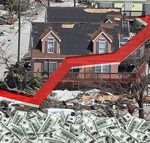In the debate over flood risk for home buyers, real estate websites are choosing sides.
Realtor.com has become the first site to disclose public and private data about flood risk for every home listing, but its competitors are resistant to follow, arguing that the disclosures will devalue homes, NPR reports.
The difference in strategy is laying bare a chasm between companies that exist to help homebuyers and those advocating for homesellers.
Read more



Realtor.com’s position is that disclosing the data will help buyers understand the true cost of purchasing and maintaining a property and they will be less likely to overpay for a property with significant in-built risk.
“It’s really important for consumers to know this,” Leslie Jordan of Realtor.com told NPR. “The more transparent we can be about these properties — about all the data about them — the more consumers will trust us as a legitimate source to make their home-buying decisions.”
Matt Eby, a co-founder of First Street Foundation, a data provider working to make flood data public, put it this way: “There’s for-profit companies and commercial actors that are taking this data, taking this knowledge, and using it to have an advantage to buy or sell homes. They’re using this at an advantage over your everyday American,” he told the network.
Other real estate sites including Redfin and Zillow don’t plan to display flood risks because they fear those disclosures will erode homeowners’ resale value.
“We need to be very careful about how we provide information,” said Taylor Marr, Redfin’s lead economist. “Could this actually reduce the value for this existing homeowner and essentially take away a lot of their net worth?”
Zillow economist Jeff Tucker offered a different reason for not adding the data to listings.
“There are a number of challenges with that,” he told NPR. But he said flood-risk data “sooner or later would be a great feature to include.” [NPR] — Erin Hudson
